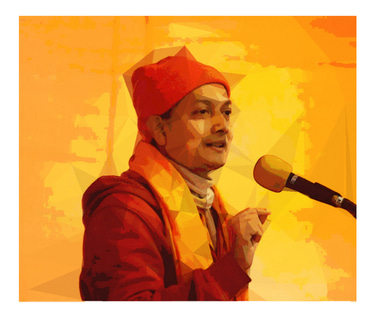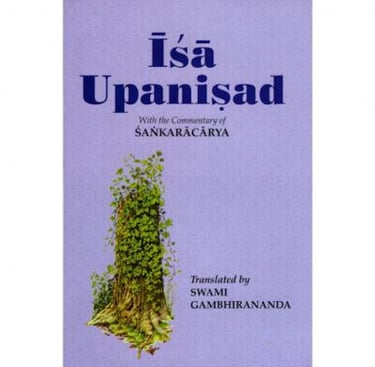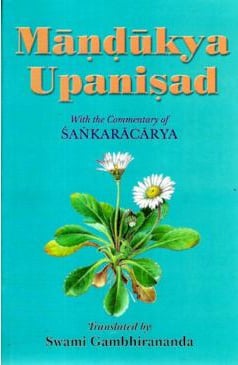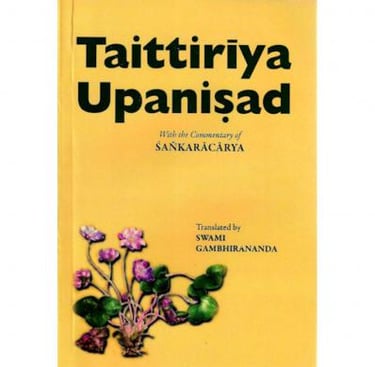Upanishads उपनिषद्
Overview
The 108 Upanishads are the portions found towards the end of each Veda (Rigveda, Samaveda, Yajurveda, Atharveda). And so, taken together, these are called Vedanta, "end of the Vedas", the final conclusion of the deepest and highest spiritual-philosophical teachings of the Vedas. Once you understand and realize the Upanishads, it is the end of having to study the Vedas, as Vedanta is the culmination of all knowledge. It is the knowledge by knowing which everything is known.
The Upanishads almost always begin with questions and relay the dialogue between a teacher and student. Swami Vivekananda says, "These ancient questions has come down to us at the present time. Millions of attempts have been made to answer it, yet millions of times it will have to be answered again." The Vedantic tradition encourages to challenge the knowledge (Vedanta), to turn answers into questions, and practice a meditative inquiry, with true love expressed in endless curiosity. Like a tree that grows its roots deep, Vedantic inquiry welcomes challenges of all in opposition and so we could be firmly established in a "faith" that is not blind and empty, but in knowledge that sees through dark tunnels of deep digging into the hard ground of reality for a solid foundation.
For the sincere seeker with intensely hot desire for enlightenment, even the shortest Upanishad is enough for liberation. However, for most students of Advaita Vedanta, we study over and over again the ten principal mukhya Upanishads with Adi Shankaracharya's Bashya (commentaries) on: Isha, Kena, Katha, Prasna, Mundaka, Mandukya, Taittiriya, Aiterya, Chandogya, and Brihadaranyaka.
Chandogya and Brihadaranyaka are voluminous books. Swami Sarvapriyananda recommends the translation of Swami Gambhirananda of the shorter Eight Upanishads with Adi Shankaracharya's commentaries.
Disclaimer/Note: The following summaries are not necessarily all from Swami Sarvapriyananda's talk, but only a student's own creative restatement from a little understanding of the lectures and readings. These may have errors as I haven't yet listened to the full series but would strive to make the details more accurate from the lessons.
Upanishad
Mahatma Gandhi said "If all Hinduism with all its scriptures were to disappear and only the first line of the Isha Upanishad remains, then all of Hinduism will remain." The verse begins with ishavashyamidam "the mouth of God", the powerful manifestation (word, mantra), the knowledge of God, indwelling and covering everything everywhere in the world through and through. Thus, the truth of the scriptures can never be lost, even amidst the infinitely changing world.
Ishavasya
Whose wealth to yearn and earn?
What treasures exist to
accummulate and cherish in a
world constantly in flux
ever slipping away?
There is no whatsoever thing
to covet and consume,
not money, neither
the ability to give charity.
God is in charge, covers and insures
every movement in the world of actions,
whatever results from all our work,
for whatsoever loss or gain,
Our Guarantor guarantees to remain.
Everything comes to pass away,
our joy remains in God alone.
God is the One treasure,
inside and out, nothing else Is.
What to desire and
hold onto in this
world of impermanence?
Ch40 Shukla Yajurveda
The Isha Upanishad invokes the purnam. Isha, God, is that purnam, infinitely compacted vibrantly overflowing fullness, which fills and saturates the whole of the infinite spectrum harmonizing infinitely expanding opposites: moving and unmoving, near and far, internal and external, material and immaterial, manifest and unmanifest. Even if the infinite layers of dynamic limitations is removed from the unconditioned infinite, infinity remains. If we detach from the shroud of avidya maya, be freed from the limitations of ignorance to reveal that joyous artful musical tapestry of vidya maya, what sorrow can there be? In light of that infinite fullness, what is there left to covet?
Upanishad
Mahatma Gandhi said "If all Hinduism with all its scriptures were to disappear and only the first line of the Isha Upanishad remains, then all of Hinduism will remain."
The verse begins with ishavashyamidam "the mouth of God", the powerful manifestation (word, mantra), the knowledge of God, indwelling and covering everything everywhere in the world through and through and all the time. Thus, the truth of the scriptures can never be lost, even amidst the infinitely changing world.
Ishavasya
Whose wealth to yearn and earn?
What treasures exist to
accummulate and cherish in a
world constantly in flux
ever slipping away?
What is yet to be filled
by God's presence
which abounds the world?
Whose wealth (of experience)
there exists to covet?
What is yet to be pervaded
by You as consciousness
experiencing all this?
You are all this,
having all these experiences.
What are you still looking for
as if anything in lack?
What to desire and
hold onto in this
world of impermanence?
Ch40 Shukla Yajurveda
The Isha Upanishad invokes the purnam, God as the infinitely compacted vibrantly overflowing fullness, which fills and saturates the whole of the infinite spectrum harmonizing infinitely expanding opposites: moving and unmoving, near and far, internal and external, material and immaterial, manifest and unmanifest. Even if the infinite layers of dynamic limitations is removed from the unconditioned infinite, infinity remains. If we detach from the shroud of avidya maya, be freed from the limitations of ignorance to reveal that joyous artful musical tapestry of vidya maya, what sorrow can there be? In light of that infinite fullness, what is there left to covet? There is no whatsoever thing to covet and consume, not money, neither the ability to give charity. God is in charge, covers and insures every movement in the world of actions, whatever results from all our work, for whatsoever loss or gain, Our Guarantor guarantees to remain. Everything comes to pass away, our joy remains in God alone. God is the One treasure, inside and out, nothing else Is.
ॐ ईशावास्यमिदं सर्वं
यत्किञ्च जगत्यां जगत्
तेन त्यक्तेन भुञ्जीथा मा गृधः
कस्य स्विद्धनम्
The Supreme Self of All animates the whole world
and runs the shadow play behind the curtain,
streaming magical surprises of mysterious movements
(rises and falls, comes and goes, appears and disappears);
therefore, detach [from the show, sit back and relax],
savour the artful musical without lust and greed for it:
what value lies in all this wealth [of experience] given us?
[Consciousness alone gives substance to the story.]
ishavashyamidam sarvam yatkinch jagatyam jagat
tena tyaktena bhujñīthā mā gṛdhaḥ:
kasya sviddhanam
Isha 1:1
All this world is covered
by the Lord.
Protect this realization
by renunciation.
Do not covet
anybody's wealth.
Upanishad
"Kena" asks "How can I?" Who or what powers my senses, breath, speech, mind, to function and directs all of my experiences? It is the eye of the eye, the mind of the mind. To know the answer you must be asanga detached from all these because that which is beyond all these cannot be known through these. It senses the senses, but it cannot be sensed by the senses. That by which words are formed cannot be put into words. It is beyond the known and the unknown. All that we know of Brahman is saguna anthropomorphisms, and the nirguna mystery of the unknown perpetuates this timeless inquiry into the transcendent immanence.
Kena
What powers my mind and body
to function and direct
all of my experiences?
येयं प्रेते विचिकित्सा मनुष्ये
ऽस्तीत्येके नायमस्तीति चैके
keneṣitaṃ patati preṣitaṃ manaḥ
kena prāṇaḥ prathamaḥ praiti yuktaḥ
keneṣitāṃ vācamimāṃ vadanti
cakṣuḥ śrotraṃ ka u devo yunakti
Kena 1:1
How can I?
How come I can?
Ch9 Talavakara Brahmana, Samaveda
Upanishad
This favorite of Swami Vivekananda's tells the story of the boy Nachiketa in search of Knowledge at the house of the Lord of Death. After his father gave him to the Lord of Death as part of the ritual sacrifice of total renunciation, he asks Yama "What Is beyond death?" Yama gives him three boons and immediately grants two: (1) forgiveness of the father, (2) the way to immortality and control over the colorful chain of life,. However, Yama refuses to answer about the difficult topic of the Hereafter. Nachiketa pressed on, "Some say there is, others say there is none. Who knows better than the Lord of Death himself?" Nachiketa refused every other possible gain that Yama suggested, so then Yama finally teaches him the Atman.
Katha
The Astika (theists) says
man has a Self (Soul)
that continue to exist after death.
For the Nastika (atheists) there is
no afterlife and no Atman.
But what does Death (Yama) say?
येयं प्रेते विचिकित्सा मनुष्ये
ऽस्तीत्येके नायमस्तीति चैके
yeyaṃ prete vicikitsā manuṣye-
‘stītyeke nāyamastīti caike
— Katha 1.1:20
What is beyond death?
of Krishna Yajurveda
Upanishad
India's national motto "Satyameva jayate" "Truth alone prevails", directly quotes from the Mundaka Upanishad which revolve on the highest non-dual truth.
Mundaka means "the shaven head", representing the knowledge which monks kept secret. The multifaceted lower knowledge is like the of flickering flames of fire sacrifices yielding destructible results, while the nondual higher knowledge is the imperishable self-luminous light of lights in the cave of the heart of conscious beings.
Mundaka
How can all my worldly knowledge
support my spiritual pursuit
of Vedanta?
How can lower knowledge
of all objects from
all of my life experiences
be transmuted into the
higher knowledge of my Self?
कस्मिन्नु भगवो विज्ञाते
सर्वमिदं विज्ञातं भवतीति
kasminnu bhagavo
vijñāte sarvamidaṃ
vijñātaṃ bhavatīti
—First Mundaka 1:3
How can the lower bird
be the higher bird?
The very rich businessman Saunaka asks a swami “How can all experiential knowledge of objects I accumulated in life fruit into true knowledge of my Self?" The swami tells the tale of two birds always together on the sorrowless Ashoka tree: The lower bird, The Experiencer (bhokta), always busy moving (karta) among the branches, tasting the sweet and bitter fruits of its likes and dislikes. Busy pecking and eating, it only takes a moment to look up whenever life tastes bitter. Noticing the other bird steadily perched higher up the tree, shining satisfaction, not seeking any fruit, in admiration of its glorious calm, the lower bird starts to move up the tree. But then whenever it sees a nice fruit it keeps forgetting the higher bird, and goes on another round of hunting for fruits.
of Atharvaveda
On the same sorrowless Ashoka tree,
the jiva moves and moans,
sunk in samsara, the dream of the night,
clutching the tree, powerless and helpless;
But when the jiva fixes its gaze absorbed
into the glorious one bowed down,
thus delivers the jiva from suffering.
samāne vṛkṣe puruṣo
nimagno’niśayā śocati muhyamānaḥ
juṣṭaṃ yadā paśyatyanyamīśamasya
mahimānamiti vītaśokaḥ
—3rd Mundaka 3:2
समाने वृक्षे पुरुषो निमग्नोऽनिशया शोचति मुह्यमानः ।
जुष्टं यदा पश्यत्यन्यमीशमस्य महिमानमिति वीतशोकः
Upanishad
"Kena" asks "How can I?" Who or what powers my senses, breath, speech, mind, to function and directs all of my experiences? It is the eye of the eye, the mind of the mind. To know the answer you must be asanga detached from all these because that which is beyond all these cannot be known through these. It senses the senses, but it cannot be sensed by the senses. That by which words are formed cannot be put into words. It is beyond the known and the unknown. All that we know of Brahman is saguna anthropomorphisms, and the nirguna mystery of the unknown perpetuates this timeless inquiry into the transcendent immanence.
Mandukya
What powers my mind and body
to function and direct
all of my experiences?
येयं प्रेते विचिकित्सा मनुष्ये
ऽस्तीत्येके नायमस्तीति चैके
keneṣitaṃ patati preṣitaṃ manaḥ
kena prāṇaḥ prathamaḥ praiti yuktaḥ
keneṣitāṃ vācamimāṃ vadanti
cakṣuḥ śrotraṃ ka u devo yunakti
Kena 1:1
How can I?
How come I can?
Atharvaveda
Upanishad
Taittiriya
Taittiriya
What powers my mind and body
to function and direct
all of my experiences?
येयं प्रेते विचिकित्सा मनुष्ये
ऽस्तीत्येके नायमस्तीति चैके
keneṣitaṃ patati preṣitaṃ manaḥ
kena prāṇaḥ prathamaḥ praiti yuktaḥ
keneṣitāṃ vācamimāṃ vadanti
cakṣuḥ śrotraṃ ka u devo yunakti
Kena 1:1


















